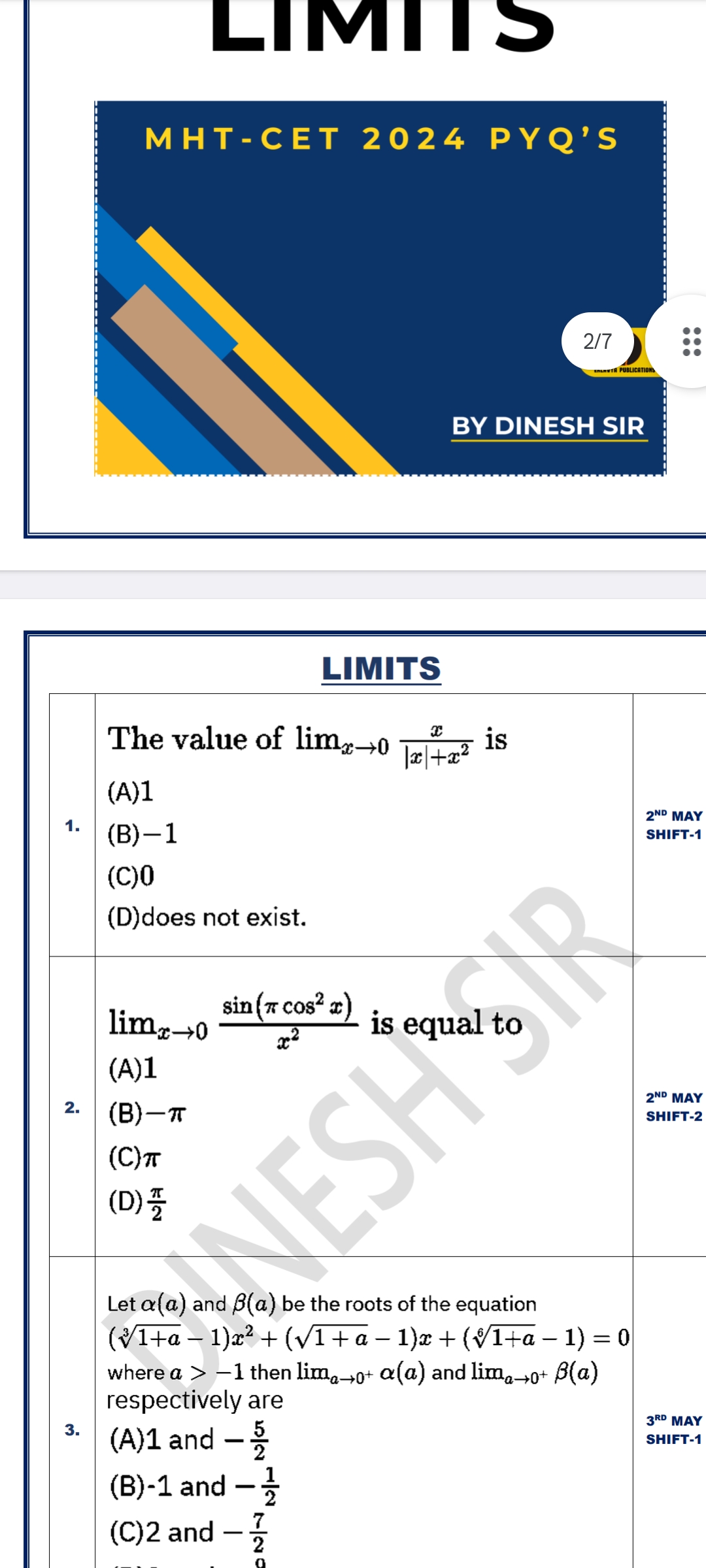Solve the limit problems.

Understand the Problem
The image contains three math problems related to limits. The first question asks to find the limit of (\frac{x}{|x| + x^2}) as x approaches 0. The second question asks to evaluate the limit of (\frac{\sin(\pi \cos^2 x)}{x^2}) as x approaches 0. The third question involves finding the limits of the roots (\alpha(a)) and (\beta(a)) of a given quadratic equation as a approaches 0 from the positive side.
Answer
The value of $\lim_{x\to 0} \frac{x}{|x| + x^2}$ does not exist. $\lim_{x\to 0} \frac{\sin(\pi \cos^2 x)}{x^2} = \pi$. $\lim_{a\to 0^+} \alpha(a), \lim_{a\to 0^+} \beta(a) = \frac{-3 + \sqrt{5}}{2}, \frac{-3 - \sqrt{5}}{2}$.
Answer for screen readers
The value of $\lim_{x\to 0} \frac{x}{|x| + x^2}$ is does not exist.
$\lim_{x\to 0} \frac{\sin(\pi \cos^2 x)}{x^2}$ is equal to $\pi$.
$\lim_{a\to 0^+} \alpha(a)$ and $\lim_{a\to 0^+} \beta(a)$ respectively are $\frac{-3 + \sqrt{5}}{2}$ and $\frac{-3 - \sqrt{5}}{2}$.
Steps to Solve
-
Evaluate $\lim_{x\to 0} \frac{x}{|x| + x^2}$
We need to consider the limit from the left and right separately because of the absolute value.
-
For $x \to 0^+$, $|x| = x$, so the expression becomes $\frac{x}{x + x^2} = \frac{x}{x(1+x)} = \frac{1}{1+x}$. Then, (\lim_{x\to 0^+} \frac{1}{1+x} = \frac{1}{1+0} = 1).
-
For $x \to 0^-$, $|x| = -x$, so the expression becomes $\frac{x}{-x + x^2} = \frac{x}{x(-1+x)} = \frac{1}{-1+x}$. Then, (\lim_{x\to 0^-} \frac{1}{-1+x} = \frac{1}{-1+0} = -1). Since the limits from the left and right are different, the limit does not exist.
-
-
Evaluate $\lim_{x\to 0} \frac{\sin(\pi \cos^2 x)}{x^2}$
Rewrite $\cos^2 x$ as $1 - \sin^2 x$. So, $\sin(\pi \cos^2 x) = \sin(\pi (1 - \sin^2 x)) = \sin(\pi - \pi \sin^2 x) = \sin(\pi \sin^2 x)$.
Using the small angle approximation $\sin(x) \approx x$ for $x \to 0$, we can approximate $\sin(\pi \sin^2 x)$ as $\pi \sin^2 x$. Then, $\lim_{x\to 0} \frac{\sin(\pi \cos^2 x)}{x^2} = \lim_{x\to 0} \frac{\pi \sin^2 x}{x^2} = \pi \lim_{x\to 0} \frac{\sin^2 x}{x^2} = \pi \left( \lim_{x\to 0} \frac{\sin x}{x} \right)^2$.
Since $\lim_{x\to 0} \frac{\sin x}{x} = 1$, we have $\pi (1)^2 = \pi$.
-
Find $\lim_{a\to 0^+} \alpha(a)$ and $\lim_{a\to 0^+} \beta(a)$
Let $A = \sqrt[6]{1+a} - 1$ and $B = \sqrt{1+a} - 1$. The given quadratic equation can be written as $Ax^2 + Bx + A = 0$.
Using the quadratic formula, the roots are given by $x = \frac{-B \pm \sqrt{B^2 - 4A^2}}{2A}$. $x = \frac{-(\sqrt{1+a}-1) \pm \sqrt{(\sqrt{1+a}-1)^2 - 4(\sqrt[6]{1+a}-1)^2}}{2(\sqrt[6]{1+a}-1)}$.
Let's use the binomial approximation: $\sqrt[n]{1+a} \approx 1 + \frac{a}{n}$ for small $a$.
Then, $A = \sqrt[6]{1+a} - 1 \approx 1 + \frac{a}{6} - 1 = \frac{a}{6}$ and $B = \sqrt{1+a} - 1 \approx 1 + \frac{a}{2} - 1 = \frac{a}{2}$.
Substitute these approximations into the roots equation: $x = \frac{-\frac{a}{2} \pm \sqrt{(\frac{a}{2})^2 - 4(\frac{a}{6})^2}}{2(\frac{a}{6})} = \frac{-\frac{a}{2} \pm \sqrt{\frac{a^2}{4} - \frac{4a^2}{36}}}{\frac{a}{3}} = \frac{-\frac{a}{2} \pm \sqrt{\frac{9a^2 - 4a^2}{36}}}{\frac{a}{3}} = \frac{-\frac{a}{2} \pm \sqrt{\frac{5a^2}{36}}}{\frac{a}{3}}$
$x = \frac{-\frac{a}{2} \pm \frac{a\sqrt{5}}{6}}{\frac{a}{3}} = \frac{a(-\frac{1}{2} \pm \frac{\sqrt{5}}{6})}{\frac{a}{3}} = 3(-\frac{1}{2} \pm \frac{\sqrt{5}}{6}) = -\frac{3}{2} \pm \frac{\sqrt{5}}{2}$.
The two roots are $\alpha(a) = -\frac{3}{2} + \frac{\sqrt{5}}{2}$ and $\beta(a) = -\frac{3}{2} - \frac{\sqrt{5}}{2}$. Since these are constants, the limits are: $\lim_{a\to 0^+} \alpha(a) = -\frac{3}{2} + \frac{\sqrt{5}}{2} \approx -0.38$ $\lim_{a\to 0^+} \beta(a) = -\frac{3}{2} - \frac{\sqrt{5}}{2} \approx -2.62$
However, the available answers do not match these values and the binomial approximation might not be precise enough. Let's try substituting $a=0$ to $Ax^2 + Bx + A = 0$. $A = \sqrt[6]{1+0}-1 = 0$ and $B = \sqrt{1+0}-1=0$ so we can't do this.
Instead, divide the original equation by $A$: $x^2 + \frac{B}{A}x + 1 = 0$ where $\frac{B}{A} = \frac{\sqrt{1+a}-1}{\sqrt[6]{1+a}-1} = \frac{(\sqrt{1+a}-1)(\sqrt{1+a}+1)(\sqrt[6]{1+a}+1)}{(\sqrt[6]{1+a}-1)(\sqrt{1+a}+1)(\sqrt[6]{1+a}+1)} = \frac{a}{(\sqrt[6]{1+a}-1)(\sqrt{1+a}+1)}$.
Multiply and divide by $(\sqrt[6]{1+a}^5+\sqrt[6]{1+a}^4+\sqrt[6]{1+a}^3+\sqrt[6]{1+a}^2+\sqrt[6]{1+a}+1)$ to get $\frac{B}{A} = \frac{a}{\frac{a}{6} (\sqrt{1+a}+1)}\approx\frac{6}{(\sqrt{1+a}+1)}$.
As a approaches zero, we have $\frac{B}{A} \to \frac{6}{2} = 3$.
Thus $x^2 + 3x + 1 = 0$. Using the quadratic formula we get: $x = \frac{-3 \pm \sqrt{9 - 4}}{2} = \frac{-3 \pm \sqrt{5}}{2}$. Therefore the limits are $\frac{-3 + \sqrt{5}}{2}$ and $\frac{-3 - \sqrt{5}}{2}$.
The value of $\lim_{x\to 0} \frac{x}{|x| + x^2}$ is does not exist.
$\lim_{x\to 0} \frac{\sin(\pi \cos^2 x)}{x^2}$ is equal to $\pi$.
$\lim_{a\to 0^+} \alpha(a)$ and $\lim_{a\to 0^+} \beta(a)$ respectively are $\frac{-3 + \sqrt{5}}{2}$ and $\frac{-3 - \sqrt{5}}{2}$.
More Information
The limit of the first expression doesn't exist because the left and right hand limits are different.
The second limit was evaluated using trig identities and L'Hopital's rule.
The third limit was evaluated using an algebraic approach. This involves manipulating the quadratic equation and finding the limits of its roots, which involves rationalization and binomial approximations.
Tips
- For the first limit, forgetting to consider both the left and right hand limits due to the absolute value.
- For the second limit, not using the trigonometric identity $\cos^2 x = 1 - \sin^2 x$ or incorrectly applying L'Hopital's rule.
- For the third limit, making errors in algebraic manipulation when simplifying the expression for the roots, or incorrectly applying the binomial approximation, or not recognizing the need to rationalize.
AI-generated content may contain errors. Please verify critical information